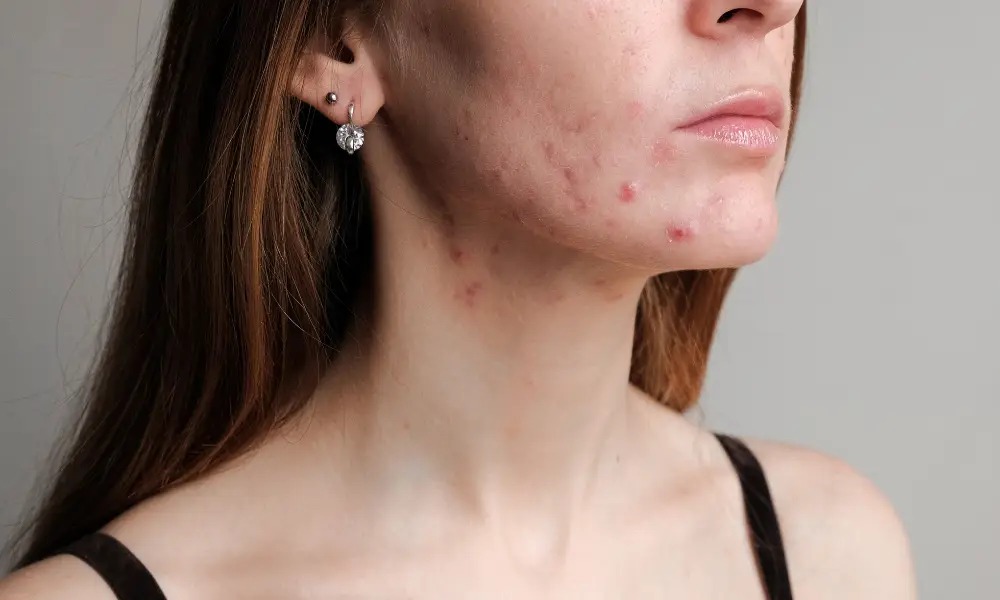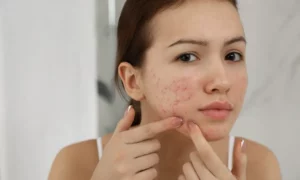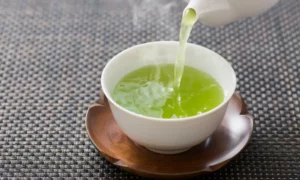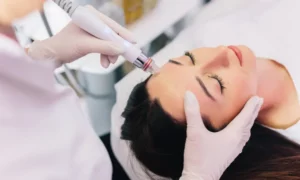Polycystic Ovary Syndrome (PCOS) is a common hormonal disorder affecting many women worldwide, with diverse symptoms, including acne. Understanding the dynamics of PCOS and its implications on skin health is crucial for effective management. In this article, we’ll delve into insightful home remedies to tackle PCOS-related acne, promoting a healthier complexion naturally.
Contents
Understanding PCOS Related Acne 
PCOS, or Polycystic Ovary Syndrome, is a hormonal disorder that affects people with ovaries. One of the common symptoms associated with PCOS is acne. PCOS-related acne is typically driven by hormonal imbalances, particularly elevated levels of androgens, which are male hormones that are also present in females but in smaller amounts.
The hormonal fluctuations in PCOS can lead to an overproduction of sebum (oil) in the skin. Excess sebum, combined with the skin cells’ natural shedding process, can clog hair follicles and pores, creating an environment conducive to the development of acne. PCOS-related acne often appears on the face, chest, and back.
These acne lesions can take various forms, including:
- Comedones: These are non-inflammatory acne lesions, including blackheads and whiteheads.
- Inflammatory Acne: Red and swollen pimples, pustules, and nodules may also occur, reflecting inflammation in the affected areas.
- Cystic Acne: Severe cases of PCOS-related acne may lead to the development of deep, painful cysts beneath the skin’s surface.
Importance Of Home Remedies For PCOS Acne
Home remedies can play a supportive role in managing PCOS-related acne, although it’s crucial to note that they are not a substitute for professional medical advice and treatment. Here are some reasons why home remedies can be important:
- Natural Approach: Many home remedies for acne associated with PCOS involve natural ingredients that are generally gentle on the skin. These remedies often focus on leveraging the inherent properties of certain foods, herbs, or substances to address specific skin concerns.
- Complementary to Medical Treatment: While medical interventions like hormonal therapy or topical medications may be prescribed by healthcare professionals, incorporating home remedies can complement these treatments. For example, a balanced diet and proper skincare routine can enhance the overall effectiveness of medical interventions.
- Cost-Effective: Home remedies are often more affordable than prescription medications or clinical treatments. This can be particularly beneficial for individuals who may have financial constraints or limited access to healthcare resources.
- Empowerment and Self-Care: Engaging in home remedies allows individuals to actively participate in their self-care. It can empower them to take control of certain aspects of their health and well-being, fostering a sense of agency and ownership over their skincare routine.
- Minimizing Chemical Exposure: Some individuals prefer natural remedies as they may want to minimize their exposure to synthetic chemicals found in certain skincare products. Home remedies often involve using simple, easily accessible ingredients that people may already have in their kitchens.
- Stress Reduction: Stress is known to exacerbate acne symptoms, and PCOS is often associated with hormonal imbalances that can be influenced by stress. Home remedies, such as relaxation techniques or herbal teas, can contribute to stress reduction, potentially benefiting both skin health and overall well-being.
Top Home Remedies For PCOS Acne 
While home remedies for PCOS-related acne may not replace medical treatments, they can be complementary and help manage symptoms. Here are some home remedies that may be beneficial:
- Balanced Diet
- Focus on a balanced diet with plenty of fruits, vegetables, and whole grains.
- Limit refined carbohydrates and sugars, as they can contribute to insulin resistance, and include foods rich in omega-3 fatty acids, such as fish, flaxseeds, and walnuts, which can have anti-inflammatory effects
- Hydration
Drink an adequate amount of water to help flush toxins from the body and keep the skin hydrated. - Green Tea
Green tea contains antioxidants that may have anti-inflammatory and acne-fighting properties. Drinking green tea regularly can be a part of a skincare routine. - Tea Tree Oil
Tea tree oil has antimicrobial and anti-inflammatory properties. It can be diluted with a carrier oil and applied topically to affected areas. However, it’s essential to do a patch test first, as some individuals may be sensitive to tea tree oil. - Apple Cider Vinegar
Diluted apple cider vinegar can be used as a toner to help balance the skin’s pH. It has antimicrobial properties that may assist in controlling acne. - Aloe Vera
Aloe vera gel, known for its soothing properties, can be applied to acne-prone areas. It may help reduce inflammation and redness. - Turmeric
Turmeric contains curcumin, which has anti-inflammatory and antioxidant effects. A turmeric face mask or incorporating turmeric into your diet may be beneficial. - Probiotics
Probiotics can promote gut health, potentially impacting hormonal balance. Yogurt and other fermented foods are good sources of probiotics. - Regular Exercise
Engaging in regular physical activity can help regulate hormones, improve insulin sensitivity, and reduce stress, all of which may contribute to managing acne.
Consultation And Professional Advice For PCOS Acne 
Consulting with a healthcare professional, such as a dermatologist or an endocrinologist, is crucial for the effective management of PCOS-related acne. Here’s why seeking professional advice is important:
- Accurate Diagnosis: Healthcare professionals can accurately diagnose PCOS and assess the severity of acne. PCOS is a complex condition, and a thorough evaluation by a qualified professional is essential for proper diagnosis.
- Individualized Treatment Plan: A healthcare professional can create a personalized treatment plan based on the specific needs and characteristics of your PCOS and acne. This may include prescription medications, hormonal therapy, or other medical interventions tailored to your situation.
- Monitoring and Adjustments: Regular follow-up appointments with a healthcare professional allow for ongoing monitoring of your progress. They can make necessary adjustments to your treatment plan if needed, ensuring optimal results.
- Prescription Medications: In some cases, prescription medications, such as oral contraceptives or anti-androgen drugs, may be recommended. These medications address hormonal imbalances and can have a significant impact on acne symptoms.
- Preventing Complications: PCOS is associated with various health risks beyond acne, including insulin resistance, diabetes, and fertility issues. Healthcare professionals can help manage these potential complications and provide guidance on overall health and well-being.
- Addressing Psychological Impact: Severe acne can have a significant impact on mental health and self-esteem. Healthcare professionals can offer support and refer individuals to mental health professionals if needed.
- Professional Skincare Guidance: Dermatologists can provide specific recommendations for skincare products and routines tailored to your skin type and the severity of your acne. This ensures that you are using effective and safe products.
- Educational Support: Professionals can provide educational resources about PCOS, its impact on the skin, and lifestyle modifications that can positively influence symptoms. Understanding the condition is an essential aspect of effective management.
Conclusion
Embracing a holistic approach to managing PCOS-related acne through home remedies, lifestyle adjustments, and professional guidance empowers individuals to nurture their skin naturally. By addressing the root causes and incorporating these practices into daily life, individuals can achieve a healthier complexion and improved overall well-being.
If you are facing PCOS related issues, PCOS treatment at HerMantra can help. Book your free trial online pcos treatment session now.





